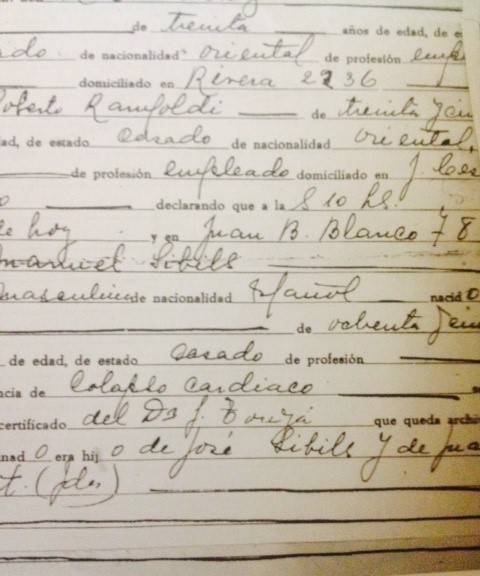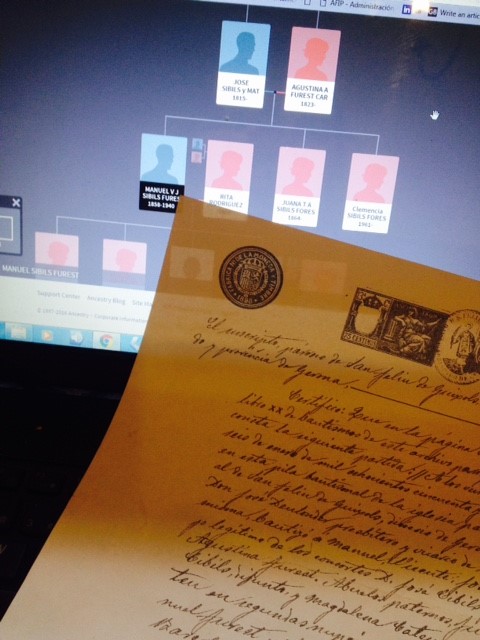How relevant are vital records?
Vital records are records of life events kept under governmental (or previously ecclesiastical) authority, including birth, marriage and death certificates.
When doing your genealogy research getting vital records is essential as they can provide details on the most important milestones in your ancestors’ lives. As they were typically created at or near the time of the event, are supposed to be accurate. They include information like the event date and place, parents’ names, occupation and residence. Many birth certificates (and baptism faiths) do also include names of grandparents besides the newborn ‘parent names.
Image 1: view of my grandmother´s birth certificate, where both, parents and grandparents names are stated.
The cause of death is also included in most death records.
Image 2: view of my great-grandfather´ death certificate where cause of death is indicated.
- Names and other relevant data of witnesses -that can be either friends or relatives-are also included in these certificates and can be a good source for additional clues.
- Once exhausted family sources for birth, marriage and death certificates, you can start your search both online and offline.
- There are a number of ancestry sites on the internet that contain old birth, marriage and death records. Online indexes at places like com and FamilySearch.org can help you request copies from vital records keepers, and in some cases the images of actual records. Some indexes link to images of actual records.
- In other cases, there are indexes that contain information that will help you request the record. If you find your ancestor in an index, be sure to click on the database title and look at the description to learn how to request the actual record. The full record will typically include details not found in the index.
- Census registers are also available on the better known genealogy sites, and are with no doubt very useful as an additional source of information, as census records indicate data such as the age of the person being censed, thus this allows for example to compare the age of our ancestor at the time of the census with the birth date from the birth certificate, and helps you at the time of distinguishing your ancestor from homonymous people. In the same sense, as census registers do also provide other relevant data such as marital status and other people living in the same house, by analyzing all the data in this context we can undergo mistakes.
What are the best search strategies for birth, marriage (divorce) and death certificates?
- Look for the death record of an ancestor first as this event is more recent than his birth or marriage. It is usually best to work from recent events backward.
- Death certificates contains age data (that leads to birth date) and may also contain other relevant data, such as the name of the spouse, and sons left. For example, reading the death certificate of one of my great grandparents, I got to know he was married by 2nd time.
- A death certificate does also indicate the place where your ancestor died, and last lived, even if both places are not the same. This can be a good indication to look for additional information in local archives.
- Death records may contain burial data, which can lead to other relevant data, even from other family members.
- However it was not until the beginning of the 20th century that many countries adopted laws to properly organize civil registration. Therefore it is also a good idea, for example to check baptism faiths, as in many countries, church registers began much before than civil registers, and church registers for baptism, do also indicate birth date, parents names and even grandparents names and have useful information on places. The same applies to religious marriages.
Image 3: this is how a baptism faith looks like. This particular document was collected by my mother in the Church of San Feliu de Guixols, Spain.
What else should I know before embarking myself in the search for vital records (and even vital statistics)?
Birth, marriage and death records availability vary depending on the country you are searching in.
- In many countries like the United States, Canada and France, civil registration (birth, marriage and death records) is not a federal jurisdiction Birth, marriage and death records are administered by each province and therefore are sometimes not available in a unique database. Therefore, it is advisable that you check local archives. Search birth, marriage and death indexes on genealogical websites such as Findmypast and Ancestry.
- In other countries the birth, marriage and death records availability vary depending on which country you are searching in. It is best to check with one of the genealogical sites listed as follows to see what records are available.
Is it possible that the vital record I am looking for is not available?
Unfortunately, the answer is yes. Vital records might not be available for different reasons:
- a record was never kept
- The information might have existed but was destroyed for different reasons like war, earthquakes, fire, etc.
But it is also possible that:
- Your ancestor might have lived in a different place from where you are looking for the birth, marriage, or death.
- Your ancestor may have used a nickname or a different surname, or the name was wrongly written at the register (or was adapted to local language).
- Your ancestor might have lived at a slightly different time from the years you are looking.
Top ten places on the web to research vital records:
- Ancestry.com
- ancestry.co.uk
- ancestry.com.au
- archives.com
- myheritage.com
- familysearch.org
- findmypast.com
- findagrave.com
- geneanet.org
- geni.com
By, Carmen Vazquez Sibils








